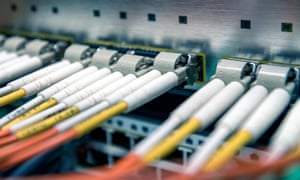Extract from The Guardian
Labor has promised to unravel the “national broadband network mess”
left by the Turnbull government and deliver the “real NBN”, via
fibre-to-the-premises, for up to 2m more Australian homes and
businesses.
It claims this can be done with no budget impact, with the public equity contribution being the same under Labor as under the Liberals.
The Labor leader, Bill Shorten, was due to launch Labor’s much-anticipated NBN policy on Monday.
He said his party’s original plan for the NBN could no longer be achieved because the Coalition had sunk $15bn into the NBN in the past three years, and much of the initial build was under contract.
But Labor would try to “fix” the NBN, and save as much of its old policy as possible, by a two-pronged approach.
Labor would scale up the rollout of fibre-to-the-premises, Shorten said, and phase out the rollout of the Coalition’s favoured fibre-to-the-node technology.
Construction of fibre-to-the-node would stop when the current pipeline of construction work was completed and construction of fibre-to-the-premises was scaled back up, Shorten said.
Labor would also commission Infrastructure Australia to manage the development of a plan that helped parts of Australia “left with Mr Turnbull’s second-rate NBN” to transition to fibre-to-the-premises.
The plan would be commissioned in the first term of a Labor government.
Shorten said Labor would cap the total funding cost of the initial NBN rollout at $57bn, and NBN Co’s independent board would make sure the new funding cap was not breached.
“The Liberals have doubled the cost of their second-rate NBN up to $56bn,” he said. “A Shorten Labor government will cap the total funding for the NBN at $57bn.
“Labor will spend exactly the same amount of public funding on the NBN as the Liberals. There will be no impact on the budget from this announcement.
“The public equity contribution will be the same regardless of who wins the election. The difference is that up to 2m more Australians will get a fibre-to-the-premises NBN under Labor.”
Multiple media reports of cost blowouts and significant delays in the rollout of the NBN led Australian federal police to raid Labor offices in Melbourne last month.
The AFP executed two search warrants in Melbourne over allegations of unauthorised leaking of confidential NBN documents.
When Malcolm Turnbull was communications spokesman in the Abbott-led opposition, he proposed a cut-price, speed-compromised version of the NBN.
Turnbull argued forcefully that Labor’s then-plan was over-the-top and that most applications needed only 12mpbs. To cut costs and deliver the network faster, the then-opposition proposed a “fibre-to-the-node” network.
Shorten claims the revised definitive agreements with Telstra and the Optus HFC agreement would not require renegotiation to implement his new plan.
He also said his initial rollout of the NBN would be complete by 30 June 2022, adding that the minimum taxpayer return from the network would increase to 3.9%, from 2.7% he says is the return under the Coalition’s policy.
It claims this can be done with no budget impact, with the public equity contribution being the same under Labor as under the Liberals.
The Labor leader, Bill Shorten, was due to launch Labor’s much-anticipated NBN policy on Monday.
He said his party’s original plan for the NBN could no longer be achieved because the Coalition had sunk $15bn into the NBN in the past three years, and much of the initial build was under contract.
But Labor would try to “fix” the NBN, and save as much of its old policy as possible, by a two-pronged approach.
Labor would scale up the rollout of fibre-to-the-premises, Shorten said, and phase out the rollout of the Coalition’s favoured fibre-to-the-node technology.
Construction of fibre-to-the-node would stop when the current pipeline of construction work was completed and construction of fibre-to-the-premises was scaled back up, Shorten said.
Labor would also commission Infrastructure Australia to manage the development of a plan that helped parts of Australia “left with Mr Turnbull’s second-rate NBN” to transition to fibre-to-the-premises.
The plan would be commissioned in the first term of a Labor government.
Shorten said Labor would cap the total funding cost of the initial NBN rollout at $57bn, and NBN Co’s independent board would make sure the new funding cap was not breached.
“The Liberals have doubled the cost of their second-rate NBN up to $56bn,” he said. “A Shorten Labor government will cap the total funding for the NBN at $57bn.
“Labor will spend exactly the same amount of public funding on the NBN as the Liberals. There will be no impact on the budget from this announcement.
“The public equity contribution will be the same regardless of who wins the election. The difference is that up to 2m more Australians will get a fibre-to-the-premises NBN under Labor.”
Multiple media reports of cost blowouts and significant delays in the rollout of the NBN led Australian federal police to raid Labor offices in Melbourne last month.
The AFP executed two search warrants in Melbourne over allegations of unauthorised leaking of confidential NBN documents.
When Malcolm Turnbull was communications spokesman in the Abbott-led opposition, he proposed a cut-price, speed-compromised version of the NBN.
Turnbull argued forcefully that Labor’s then-plan was over-the-top and that most applications needed only 12mpbs. To cut costs and deliver the network faster, the then-opposition proposed a “fibre-to-the-node” network.
Shorten claims the revised definitive agreements with Telstra and the Optus HFC agreement would not require renegotiation to implement his new plan.
He also said his initial rollout of the NBN would be complete by 30 June 2022, adding that the minimum taxpayer return from the network would increase to 3.9%, from 2.7% he says is the return under the Coalition’s policy.

No comments:
Post a Comment